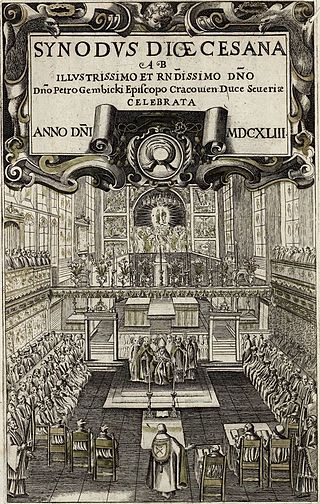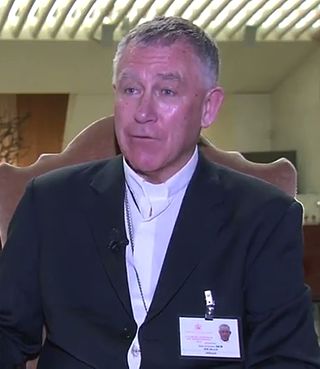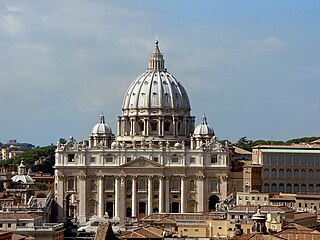Related Research Articles
Presbyterianpolity is a method of church governance typified by the rule of assemblies of presbyters, or elders. Each local church is governed by a body of elected elders usually called the session or consistory, though other terms, such as church board, may apply. Groups of local churches are governed by a higher assembly of elders known as the presbytery or classis; presbyteries can be grouped into a synod, and presbyteries and synods nationwide often join together in a general assembly. Responsibility for conduct of church services is reserved to an ordained minister or pastor known as a teaching elder, or a minister of the word and sacrament.

A synod is a council of a Christian denomination, usually convened to decide an issue of doctrine, administration or application. The word synod comes from the Greek: σύνοδος [ˈsinoðos] meaning "assembly" or "meeting" and is analogous with the Latin word concilium meaning "council". Originally, synods were meetings of bishops, and the word is still used in that sense in Catholicism, Oriental Orthodoxy and Eastern Orthodoxy. In modern usage, the word often refers to the governing body of a particular church, whether its members are meeting or not. It is also sometimes used to refer to a church that is governed by a synod.
The Evangelical Lutheran Church in America (ELCA) is a mainline Protestant Lutheran church headquartered in Chicago, Illinois. The ELCA was officially formed on January 1, 1988, by the merging of three Lutheran church bodies. As of 2021, it has approximately 3.04 million baptized members in 8,724 congregations.

Hyacinthe Thiandoum was the first native Archbishop of Dakar (Senegal) and who was elevated to the cardinalate in mid-1976 by Pope Paul VI.

In several of the autocephalous Eastern Orthodox churches and Eastern Catholic Churches, the patriarch or head bishop is elected by a group of bishops called the Holy Synod. For instance, the Holy Synod is a ruling body of the Georgian Orthodox Church.

Péter Erdő is a Hungarian Cardinal of the Latin Church of the Catholic Church, who has been the Archbishop of Esztergom-Budapest and Primate of Hungary since 2003.

Josip Bozanić is a Croatian Cardinal of the Catholic Church. He is the eighth Archbishop of Zagreb, having previously served as Bishop of Krk from 1989 to 1997. He was elevated to the cardinalate in 2003. He is a member of the Supervisory Commission of Cardinals of the Institute for the Works of Religion, along with other five cardinals.
The General Synod is the tricameral deliberative and legislative organ of the Church of England. The synod was instituted in 1970, replacing the Church Assembly, and is the culmination of a process of rediscovering self-government for the Church of England that had started in the 1850s.
An episcopal conference, sometimes called a conference of bishops, is an official assembly of the bishops of the Catholic Church in a given territory. Episcopal conferences have long existed as informal entities. The first assembly of bishops to meet regularly, with its own legal structure and ecclesial leadership function, is the Swiss Bishops' Conference, which was founded in 1863. More than forty episcopal conferences existed before the Second Vatican Council. Their status was confirmed by the Second Vatican Council and further defined by Pope Paul VI's 1966 motu proprio, Ecclesiae sanctae.

The Convocations of Canterbury and York are the synodical assemblies of the bishops and clergy of each of the two provinces which comprise the Church of England. Their origins go back to the ecclesiastical reorganisation carried out under Archbishop Theodore of Canterbury (668–90) and the establishment of a separate northern province in 733. Until 1225 the synods were composed entirely of bishops, but during the thirteenth century more and more clergy were cited until by 1283 the membership was established as the bishops, deans, archdeacons and abbots of each province together with one proctor (representative) from each cathedral chapter and two proctors elected by the clergy of each diocese. The main purpose of the convocations was to take counsel for the well-being of the church and to approve canonical legislation, but in practice much time was spent in discussing the amount of tax to be paid to the Crown since the clergy were a separate estate of the realm and refused to be taxed in or through Parliament. Before the end of the nineteenth century, the Convocation of Canterbury, which was numerically very much larger, played the major role and the activity of the Convocation of York was often little more than giving formal approval to the decisions taken by the southern province.

John Atcherley Dew is a Roman Catholic bishop. He is the sixth Roman Catholic Archbishop of Wellington and the Metropolitan of New Zealand, serving since 2005. He was also created a cardinal by Pope Francis in 2015.
An instrumentum laboris is a type of Vatican official document used at a General Assembly of the Synod of Bishops. The first such document was drafted for the Synod on evangelization in 1974.

The Roman Catholic Diocese of Virac is a diocese of the Latin Church of the Roman Catholic Church in the Philippines. The Diocese of Virac, Catanduanes was established in 1974, from territory in the Diocese of Legazpi and the diocese is a suffragan of the Archdiocese of Caceres.

Lorenzo Baldisseri is an Italian prelate of the Catholic Church who served as Secretary General of the Synod of Bishops from 21 September 2013 until 15 September 2020. He was made a cardinal in 2014. He previously served as Secretary of the Congregation for Bishops after more than twenty years in the diplomatic service of the Holy See that included stints as Apostolic Nuncio to Haiti, Paraguay, India, Nepal, and Brazil.
In the Catholic Church, the Synod of Bishops, considered as an advisory body for the pope, is one of the ways in which the bishops render cooperative assistance to him in exercising his office. It is described in the 1983 Code of Canon Law as "a group of bishops who have been chosen from different regions of the world and meet at fixed times to foster closer unity between the Roman Pontiff and bishops, to assist the Roman Pontiff with their counsel in the preservation and growth of faith and morals and in the observance and strengthening of ecclesiastical discipline, and to consider questions pertaining to the activity of the Church in the world."

The Third Extraordinary General Assembly of the Synod of Bishops, the first of two synods popularly referred to as the Synod on the Family, was held in Vatican City on 5–19 October 2014 on the topic of Pastoral Challenges of the Family in the Context of Evangelization. The Synod was a gathering of 253 bishops and other participants in preparation for a larger synod with the same theme in October 2015. The participants discussed problems facing the family today, including the effects of war, immigration, domestic violence, sexual orientation, polygamy, inter-religious marriages, cohabitation, the breakdown of marriage, and divorce and remarriage. In particular, the synod was marked by debate regarding the pastoral care of Catholics living in "irregular unions", including those civilly remarried after divorce, unmarried cohabitating couples, and especially gay Catholics. The synod was also noted for a new prominence of African bishops.

The Fourteenth Ordinary General Assembly of the Synod of Bishops, popularly referred to as the Synod on the Family, took place from 4 to 25 October 2015 with the theme of "the vocation and mission of the family in the Church and in the contemporary world." It was "reflect[ing] further on the points discussed" at the 2014 Third Extraordinary General Assembly of the Synod of Bishops "so as to formulate appropriate pastoral guidelines" for the pastoral care of the person and the family. The 2014 assembly of the synod, called to define the status quaestionis and to collect the participants' experiences and proposals, can be understood as a preparation for the 2015 assembly, but they are meant to "form a single organic unity." It took place in the Synod Hall in the Paul VI Audience Hall in Vatican City.

The 15th Ordinary General Assembly of the Synod of Bishops, commonly referred to as the Synod on Young People, is a Roman Catholic synod that took place 3–28 October 2018 and had as its theme "Young People, Faith, and Vocational Discernment". Its aim was to "accompany young people on their way of life towards maturity so that, through a process of discernment, they can discover their life project and realize it with joy, opening the encounter with God and with men, and actively participating in the building up of the Church and society".
The Synod of Bishops for the Pan-Amazon region, commonly referred to as the Amazon synod, met in Rome from 6 to 27 October 2019. Pope Francis announced on 15 October 2017 that a special assembly of the Synod of Bishops would work "to identify new paths for the evangelization of God's people in that region", specifically the indigenous peoples who are "often forgotten and without the prospect of a serene future".

The 16th Ordinary General Assembly of the Synod of Bishops, commonly referred to as the synod on synodality, is an upcoming synod of bishops of the Catholic Church which will conclude in October 2024 and has as its theme "For a synodal Church: communion, participation and mission".